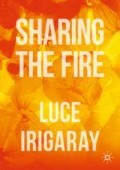Abstract
Letting happen the ones who we are does not only mean letting our being appear but allowing our ‘to be’ to exist, opening a place in which it can take place and enter into presence. It is to give back our ‘to be’ to life. This cannot amount to merely inciting it to become apparent but rather asks us to gather our selves together, to be in communion with ourselves in order to remember the ‘to be’ that we are and to ensure a collecting of our selves starting from which this ‘to be’ may become present—also to the other. To be present to one another requires us to let our ‘to be’ be present in each—as a question, a mystery, a life of which we must take care and bring into the world.
Access this chapter
Tax calculation will be finalised at checkout
Purchases are for personal use only
Notes
- 1.
I apologize for the quite inelegant use of ‘to be’, and this from the very beginning of the volume. However, to use ‘being’—or even ‘Being’—instead of ‘to be’ makes the meaning that I try to convey incomprehensible. Indeed, being is a present participle, which expresses a current modality or way of existing of a/our ‘to be’, or a substantive which amounts to a fixation of this modality or existence in a noun which is presumed to indicate its essence. And yet, if ‘to be’ can become incarnate in the present, this incarnation never corresponds to its comprehensive potential. Nevertheless, far from reducing ‘to be’ to an idea or a cultural essence, I rather intend to send this/our ‘to be’ back to a natural origin. I might dare say that I attempt to give it back to its natural essence—as an oak designates the natural essence of a particular tree, and a man or a woman designates the natural essence of a human being. My use of ‘to be’ is thus a call for a return to a real living potential and not for a subjection to an ideal essence. It also means that every existence must be rooted in a unity from which it arouses and to which it must be able to return so as to not risk ending in nothing. In our Western languages, in particular in English, it is difficult to make clear such a meaning that the verb ‘être’ in French or ‘Sein’ in German can more easily express. So, for example, ‘être’ can signify both the singularity of a being, especially of a living being, and its comprehensive potential and dynamism. I thus allow myself to, sometimes, use ‘to be’, instead of the usual ‘being’ or ‘Being’, whatever the inconvenience in reading, because I hope that this will contribute to a better perception of the thinking that I try to pass on.
Author information
Authors and Affiliations
Rights and permissions
Copyright information
© 2019 The Author(s)
About this chapter
Cite this chapter
Irigaray, L. (2019). The Desire to Be. In: Sharing the Fire. Palgrave Macmillan, Cham. https://doi.org/10.1007/978-3-030-28330-8_2
Download citation
DOI: https://doi.org/10.1007/978-3-030-28330-8_2
Published:
Publisher Name: Palgrave Macmillan, Cham
Print ISBN: 978-3-030-28329-2
Online ISBN: 978-3-030-28330-8
eBook Packages: Religion and PhilosophyPhilosophy and Religion (R0)

